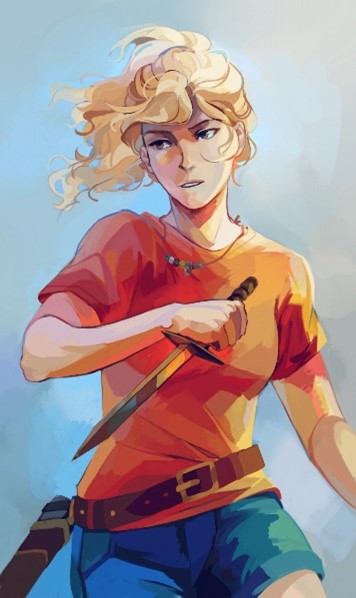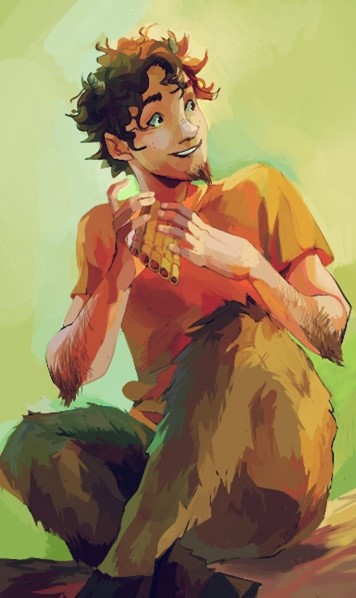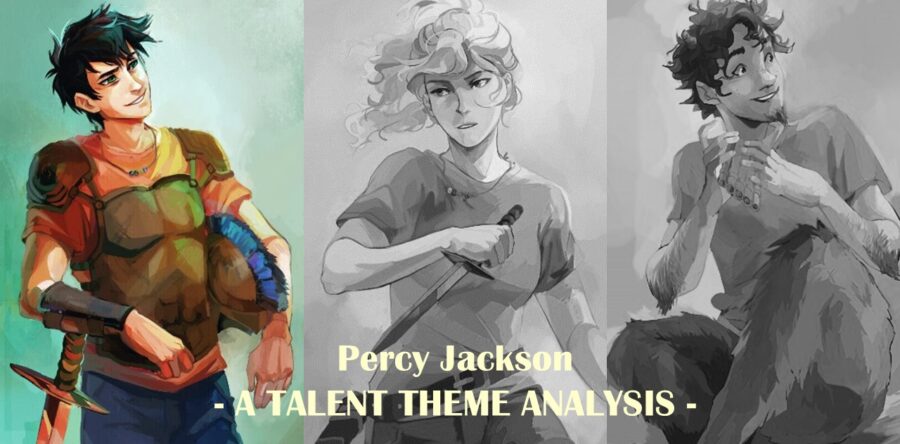(Artwork by: Viktoria Ridzel)
Part #1: Percy Jackson's CliftonStrengths Talent Analysis
- Consistency (Executing)
The first talent theme that Percy embodies very clearly is his #consistency. In the CliftonStrengths language, consistency is “the need to treat people the same, no matter what their station in life, so you do not want to see the scales tipped too far in any one person's favor.” Simply put, anyone who bears the consistency talent theme values fairness and has a strong sense of justice.
In The Lightning Thief, Percy felt the need to stand up against bullies such as Nancy Bobofit and Gabe Ugliano when Grover and his mum were harassed by them respectively. Later on, when he heard of the reason that made Zeus turn Thalia into a pine tree, he uttered, “But it isn’t fair! It isn’t the little girl’s fault.” Although he had no personal relations with Thalia, his strong reaction to the story implied his contempt for the injustice she received. The same contempt would be even greater when someone he knows is involved. For example, when Grover was punished for losing Thalia, he mentioned, “Because you wouldn’t leave two other half-bloods behind? That’s not fair.” He also thought that it was unfair for Hades to capture his mother as a hostage, given that she had nothing to do with the Gods' internal riff. Additionally, Percy also reacted strongly when he was being blamed for an issue not caused by him. When Percy and Poseidon were accused by Hades of stealing the lightning bolt, he thought to himself “…he was trying to frame me and my dad for a theft we didn’t commit” and “Nothing gets me angrier than being accused of something I didn’t do.” In the Sea of Monsters, Tantalus accused Percy’s bad chariot driving skills as the cause of the Stymphalian Birds’ attack, to which he retaliated by telling him to chase a doughnut as he felt it was “so completely unfair”.
Undoubtedly, fairness is something that Percy values a lot and makes him willing to take certain actions so that justice can be served. Although most of us also possess a sense of justice to a certain extent, people with consistency would go the extra mile to ensure that fairness is adhered to.
- Competition (Influencing)
Another possible talent theme that Percy would most likely possess is #competition. By definition, this talent theme describes “You need to compare. If you can compare, you can compete, and if you can compete, you can win. And when you win, there is no feeling quite like it.” In short, benchmarking against and outdoing others is something that an individual with #competition would do.
In Percy’s case, he has had plenty of battles against enemies way stronger than him, which he was able to overcome on his own most of the time. The first instance where his #competition shone was his battle with the Minotaur in The Lightning Thief. Before his mother was vaporized by the Minotaur, he was an untrained demigod who was on the losing end against a creature of Greek Mythology. After witnessing his mother’s demise, he recalled, “rage filled me like high-octane fuel” and he somehow managed to snap the Minotaur’s horn and defeat the monster with it. Later, when he was sword sparring with Luke and was about to be taken down, he described a “short burst of manic energy” which led him to persevere and try out his newly learnt disarming manoeuvre and ended up winning the duel. He even initiated a challenge against the God of War despite being a mere demigod; “Fight me yourself, Ares.” Eventually, Percy managed to stab Ares in his heel and caused the God to flee, demonstrating his strive to win against a tougher opponent. During his battle against the cyclops Polyphemus in the Sea of Monsters, he once again described that “Strength coursed through my body. I raised my sword and attacked, forgetting that I was hopelessly outmatched.” Finally, at the end of Sea of Monsters, when the demigods had a rematch of the chariot race, he thought to himself, “I didn’t care about the prize. I just wanted to win.”
These examples show us that Percy is someone who produces better results when fighting against an enemy who is more powerful than him. The motivation to win against stronger opponents truly demonstrates his ability to improve his performance even in the face of defeat, thus, embodying the essence of #competition.
- Responsibility (Executing)
Unlike its traditional meaning, the #responsibility talent theme means you “take psychological ownership for anything you commit to, and whether large or small, you feel emotionally bound to follow it through to completion. You are committed to stable values such as honesty and loyalty.” If you have this talent theme, it means that you place equal weight on others’ responsibilities as much as your own.
Interestingly, Percy’s #responsibility is affirmed by Athena, when she told him that his fatal flaw is his personal loyalty to his friends. “You do not know when it is time to cut your losses. To save a friend, you would sacrifice the world.” True enough, in The Lightning Thief, his mother was captured in an attempt to manipulate him to find the lightning bolt. In Sea of Monsters, he left camp without permission despite having to face the consequence of expulsion, just so he could save his friend Grover, who was captured by Polyphemus. In Titan’s Curse, when Annabeth got captured by the Manticore, he blamed himself for being unable to protect her, and again blamed himself when he felt that he should have died instead of Bianca in the land without rain. He felt responsible for her death albeit it was something uncontrollable by him as dictated by the quest prophecy. His #responsibility also extends to the prophecy that Kronos intend to influence to cause the Gods’ downfall. Despite the existence of another Big Three kid (Hade’s son Nico) who can fit into the prophecy’s eligibility, Percy did not want the prophecy to fall onto Nico. Instead, he chose to accept that the prophecy is about him, regardless of the dangers that may follow. When questioned by Annabeth, “You want to be responsible for the whole world?”, his internal thought was “It was the last thing I wanted, but I didn’t say that. I knew I had to step up and claim it.”
His #responsibility talent theme is telling, as the examples showed that he felt psychological ownership of all the incidents that happened to the people around him, despite being unable to change the events of their characters’ fates. Even if it was an event that he could personally avoid, he would voluntarily shoulder the responsibility just so he could lift the burden of others, which fully demonstrates the spirit of this talent theme.
Check out other characters here:




